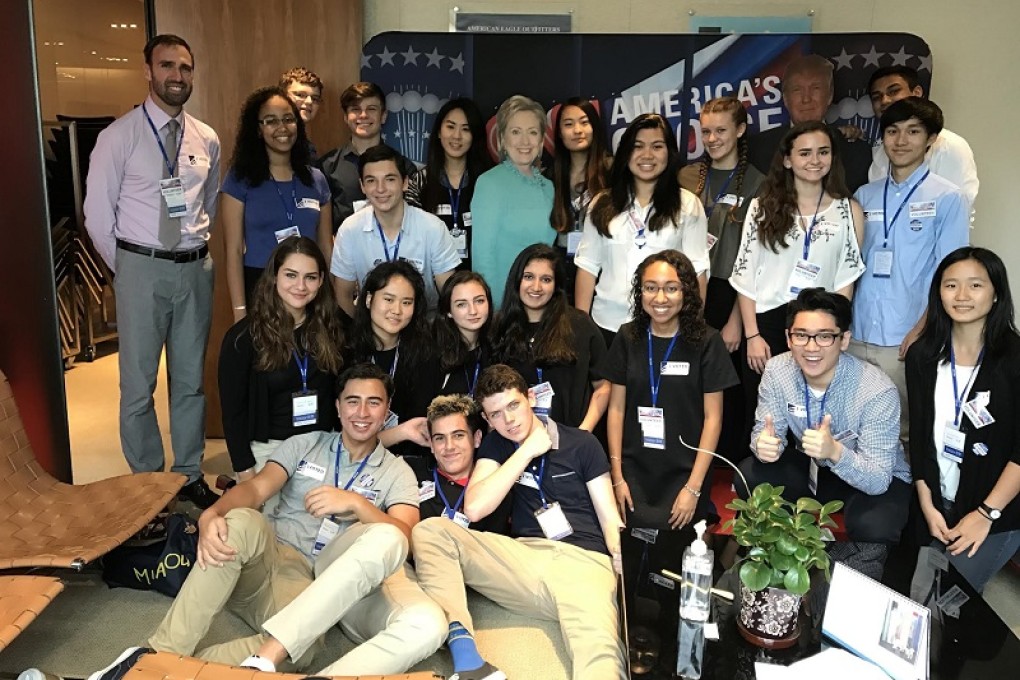HKIS hosts mock election
Tension from upcoming US presidency is being felt overseas

The year was 1829. Muddied boots danced on the pristine tables of the White House. Joyous cacophony from the crowd as Andrew Jackson accepted the presidency. A presidency whose power was derived from the people. The first populist president had been elected.
After a tense election season through 2016, another populist was elected: Donald Trump. The division this closely-followed election caused was felt not only throughout the United States, but also internationally.
On November 9, the American Chamber of Commerce hosted Election Central 2016, an event where interested individuals in Hong Kong could follow the election. Excited conversation flowed throughout the room, with many trying to predict which candidate would be elected: Donald Trump or Hillary Clinton.
High School students from Hong Kong International School wandered about, handing out ballots for a mock vote. Television screens on all sides of the room played live CNN election coverage, and reporters with television cameras patrolled, hunting for their next interview.
In a side room, HKIS students counted the first of the mock ballots, and already there was a clear leaning towards Clinton. Ali Tahabrown (11) an HKIS student who helped run the mock election remarked, “I was quite surprised to see the huge lead that Clinton had over Trump in the mock election.”
As the Clinton tally rose in Hong Kong, CNN predicted a clear Trump victory in some early states: Kentucky and Indiana. While these states had long been predicted to vote Trump, tension filled the room nonetheless. The murmured justifications for Trump’s victories and the optimistic theorizing of Clinton’s future victories all hushed as the last votes for the battleground state of Virginia were counted.
A cheer ran through the room as John King colored the state of Virginia blue. This cheer was somewhat tempered by the count of Florida coming painfully slowly to an end, with Trump in the lead.
The discrepancy in Clinton and Trump support between Hong Kong and the United States was becoming clearer. “The majority of Trump’s base is the working class, and most Americans in Hong Kong work in the financial sector, so I think that Trump's outsider rhetoric didn't really resonate with them,” Tahabrown (11) explained.
Ella Hurworth, a junior at HKIS, commented, “I remember there was one woman who was really vocal, clapping and cheering, when Trump was ahead, but I seem to recall that she was the only one who was clearly pleased about this.”
Through all the tension, the American Chamber of Commerce brought in guest speakers, including US Consul General Kurt Tong, Chamber President Richard Vuylsteke, American Women’s Association in Hong Kong President Marcy McAllister LaRont, Country Chair for Democrats Abroad Shaun Barnes, and HKIS Head of School Alan Runge.
“It was really interesting hearing representatives from Democrats Abroad and the Chamber of Commerce talk. You could tell that there were some important people in the room,” Tahabrown (11) said. Sofia Manghelli, a sophomore at HKIS, had the chance to meet with the Consul General. “I really value the experience, it's amazing that even at my age I already have such great opportunities to make connections and network with people like him,” Manghelli (10) said.
Reporters from Reuters, RTHK, CNN, BBC, and other news outlets were also present. Throughout the day, RTHK interviewed various people on live radio, including many of the guest speakers, the Secretary of Republicans Overseas Tariq Dennison, HKIS government teacher Brian Oliver, and two HKIS students, Ella Hurworth and Rael Baird.
“There were so many experts and 'big wigs' at the event that could've offered great insight, but I'm so appreciative that they recognised the tremendous value of student perspective. This election will impact our generation just as much as it will any other generation, therefore I'm grateful that they involved us in the process and took our opinions and knowledge into consideration,” Hurworth (11) remarked.
CNN was also present, interviewing HKIS junior Thomas Hill, “I was quite surprised, but at the same time it was cool that someone wanted to know what I, as a high school student, was thinking.
Hill concludes, “We, as young people, are going to be the ones affected by any decisions made now, so it's important [that the media] hear what we think.”
The engagement of students and viewers at Election Central illustrates the importance of people in democracy, so we must all stay aware and involved.